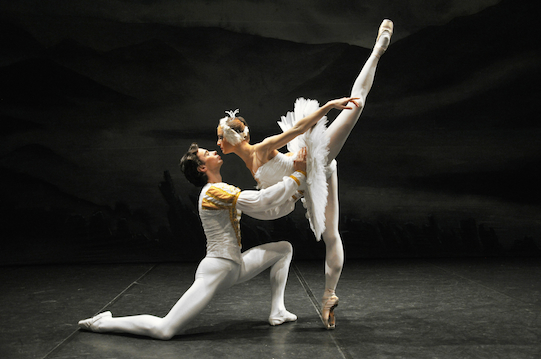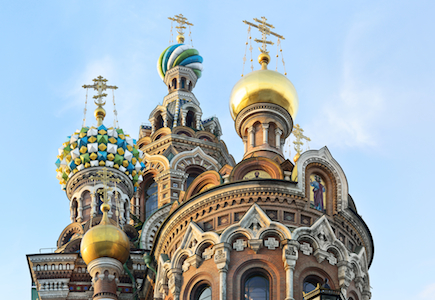Why Study Russian?
Main Points
- 300 million people around the world speak Russian, 160 million of whom consider it to be their native language
- Understanding Russian brings business opportunities and is important for science and technology
- Russia is home to some of the world’s finest traditions in the arts. Ballet, theatre, cinema, literature, music, and visual arts are only a few of the areas in which Russians have established great traditions and continue to produce remarkable innovators
Russian is widely spoken
Ranked the fifth most prevalent language in the world, 300 million people around the world speak Russian, 160 million of whom consider it to be their native language. The Russian Federation spans nine time zones and covers about 1/8th of the world’s land surface. It is the largest country in the world, almost twice the size of the United States. Russia has a population of almost 150 million people, which constitutes slightly more than 50% of the population of the former Soviet Union.
Russia as an important world power
The Eurasian Economic Union (EAEU or EEU) is an economic union of states in northern Eurasia. A treaty aiming for the establishment of the EEU was signed in 2014 by the leaders of Belarus, Kazakhstan, Armenia and Russia. This looks to prospectively boost Russian economic, foreign policy and military influence in the region. NASA depends on the Russian Space Agency to transport astronauts to the International Space Station. Finally, Russia's resource-based economy has emerged from the global crisis relatively unscathed. Energy industry analysts suggest that up to 50% of Europe's natural gas could be controlled by Russia by 2030.
Knowing Russian brings business opportunitiesRussian entrepreneurs are well-versed in international economics and willingly establish business relationships with partners from abroad, and, due to the size of the country and its natural resources, the Russian market is of great interest to foreign businessmen. The Russian economyRussia is one of the largest producers of numerous natural resources and raw materials including petroleum, diamonds, gold, copper, manganese, uranium, silver, graphite, and platinum. Russia is the second largest steel producer in the world after Japan, and has an enormous timber reserve. It is the world’s largest producer of natural gas, third largest producer of oil and fourth largest in terms of the mining of coal. Russia has an estimated 40% of the world total reserves of natural gas. Russia’s proven oil reserves are second only to Saudi Arabia’s, and it is the top oil producer in the world. |
© Grauvision | Dreamstime.com - St. Petersburg, Russia, Spas At Blood Photo |
Russian is an important language for science and technology
According to a recent study, the number of science publications is highest in English, with Russian second. Russia has always had a rich tradition in the sciences, from Mendeleev to recent Fields medallists in mathematics; however, more recent innovations in computer programming, software engineering, and information technology are pouring out of public and private enterprises.
A fascinating cultureRussia is home to some of the world’s finest traditions in the arts. Ballet, theatre, cinema, literature, music, and visual arts are only a few of the areas in which Russians have established great traditions and continue to produce remarkable innovators. Travel and adventureRussia occupies a vast territory offering plenty of opportunities to enjoy resort towns with spectacular beaches, experience the taiga with its diverse wildlife and unexplored places, visit the Russian Far East where the sun rises while people in the Western parts of the country are still fast asleep. There is so much to see and do in Russia, and speaking a little Russian will help you to meet all sorts of fascinating people and make the most of every moment. |

|
Knowledge of the Russian language is useful for work with archival documents
Russia’s history is of great importance in understanding World history; playing a crucial role in the development of the world throughout past centuries. Recently opened archives have enabled Russian speaking researchers to look into the past and understand the cause and effect behind many global events.
Why Russian is not as hard as you think
Some people say that the Russian language can be hard to learn but this is not really true. The main difficulty for a lot of people is learning the new grammar structure. However, if you have learnt other languages before you will already be familiar with some of these grammatical concepts, such as gender and cases.
In fact, there are many things that make Russian easier to learn than other languages. The key is to use these things to your advantage. Here are some things that make Russian easier.
- Students learn the entire Russian alphabet in the first week of class and write and read it well by the end of the third week. After all, about 18 of the letters should at least look familiar to you already.
- Once you learn the alphabet, you can pronounce almost all words quite accurately. With Russian the pronunciation is normally quite clear from the written form of the word.
- Russian does not use complicated sentence structures like English, you can normally say exactly what you want with just a few words. For example, in English to be polite we would say something like “can you please pass me the salt”, however in Russian we would say something simpler like “give salt please”. Speaking so directly may feel unusual for an English speaker, however it is perfectly normal, just add the word ‘please’ to be polite. This makes it easy to say what you want in Russian, and it will probably be correct. Less words also makes listening to people easier, as you can just pick out the important words.
- Russian uses the case system. Instead of having a strict sentence word order like in English, you just need to change the ends of the nouns. This makes Russian a very expressive language, because you can emphasise a point by changing the order of the words in a sentence. It also helps you understand what people are trying to say.
- Russian does not use articles. (Like “a” and “the”)
- Russian has fewer tenses than English. Russian does not bother with the difference between “I was running”, “I had been running”, etc.
Studying Russian at WarwickThe aim of the course, as well as to develop skills in speaking, reading, listening and writing, is to enable students to improve their ability to read a range of texts in different registers, including stories from classical Russian literature and articles on history, culture and contemporary society of the Russian speaking world |

© Zaharov | Dreamstime.com - Kucherlinskoe Lake, Altay, Russia Photo |

